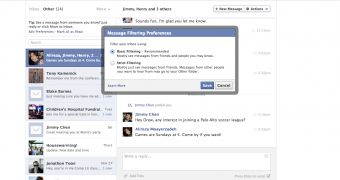Facebook has been working on creating the one true inbox with Messages. The idea is to have every message you send or receive, email, Facebook messages even SMS' end up in the same place and in the same conversation. It's a great idea, but Facebook still has some work to do.
It's now making some changes to the way Messages works to further that goal. It's also experimenting with asking people to pay to send you a message if they're not your friends.
First things first, Messages is dropping the existing privacy settings in favor of filters.
People who allowed everyone or friends of friends to send them messages will get the Basic Filtering option. Those that only allowed friends will get the Strict Filtering option.
With Basic Filtering, most things, apart from straight out spam, will get through.
With Strict Filtering, you'll only see messages from friends, emails from friends and messages from Android users that have you in their contacts even though you may not be friends with them on Facebook.
Along with those changes, Facebook is also experimenting with a new way of ensuring that the messages that get to you are important.
Until now, messages from people you didn't know or hardly talked to were sent straight to the Other folder, which very few people check.
Now, to make sure that people who really need to contact you can, Facebook will be experimenting with asking for a $1 fee to bump that message from the Other folder to the regular inbox.
It may seem like a nefarious move from Facebook, but it's likely not a financially motivated one. Facebook will be making some money with this, but not much.
Rather, the idea is to discourage people from sending useless messages and make sure that you get less messages you don't want to while also receiving the important ones.
The feature will only work for regular users, i.e. not pages. Users will also be limited to one of these paid messages per week, in the initial test which is limited to the US.

 14 DAY TRIAL //
14 DAY TRIAL //